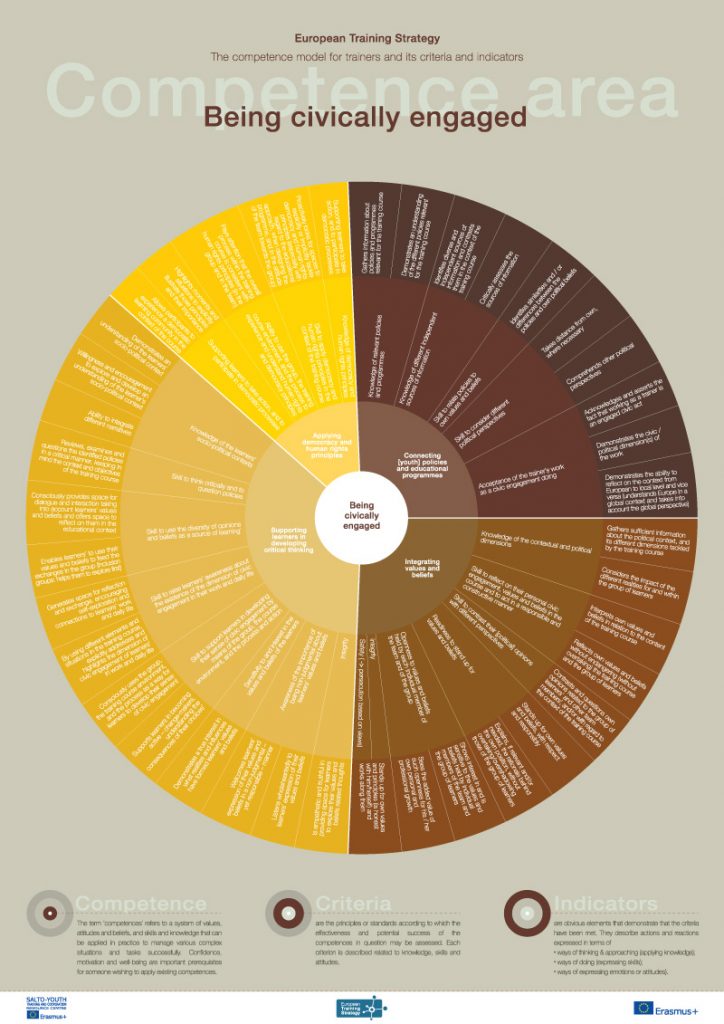Being civically engaged
1.1. Knowledge of relevant policies and programmes
1.1.1. Gathers information about policies and programmes relevant for the training course
1.1.2. Demonstrates an understanding of the different policies relevant for the training course
1.2. Knowledge of different independent sources of information
1.2.2. Critically assesses the sources of information
1.3. Skill to relate policies to own values and beliefs
1.3.1. Identifies similarities and / or differences between the policies and own political beliefs
1.4. Skill to consider different political perspectives
1.4.1. Takes distance from own where necessary
1.4.2. Comprehens other political perspectives
1.5. Acceptance of the trainer’s work as a civic engagement doing
1.5.1. Acknowledges and asserts the fact that working as a trainer is an engaged civic act
1.5.2. Demonstrates the civic/political dimension(s) of the work
2. Integrating values and beliefs
2.1. Knowledge of the contextual and political dimensions
2.1.1. Gathers sufficient information about the political context and its different dimensions tackled by the training course
2.1.2. Considers the impact of the different realities for and within the group of learners
2.2.1. Interprets own values and beliefs in relation to the content of the training course
2.3. Skill to contrast their [political] opinions with different perspectives
2.4. Readiness to stand up for values and beliefs
2.4.1. Stands up for own values and beliefs, with respect and responsibly
2.5. Openness to values and beliefs held by each individual members of the team and of the group
2.5.2. Sees the added value of such openness for his/her own personal and professional growth
2.6. Integrity
2.7. Safety (persecution based on views)
2.7.1. Stands up for own values and principles (is honest with him/herself) and works along with them
3. Supporting learners in developing critical thinking
3.1. Integrity
3.2. Awareness of the importance of being non-judgmental about learners’ values and beliefs
3.2.1. Listens wholeheartedly to learners’ expression of their values and beliefs
3.3. Sensitivity to and interest in the values and beliefs of the learners
3.5. Skill to raise learners’ awareness about the existence of the dimension of civic engagement in their work and daily life
3.5.1. By using different elements and situations in the training course, explicitly addresses and highlights the dimension of civic engagement of learners’ in work and daily life
3.5.2. Generates space for reflection and exchange, encouraging self-exploration and connections to learners’ work and daily life
3.6. Skill to use the diversity of opinions and beliefs as a source of learning’
3.7. Skill to think critically and to question policies
3.8. Knowledge of the learners’ socio-political contexts
3.8.1. Ability to integrate different narratives
3.8.2. Willingness and encouragement to explore and develop an understanding of the learner’s socio-political context
3.8.3. Demonstrates an understanding of the learners’ socio-political context
4. Applying democracy and human rights principles
4.1. Supporting learners to take action, and to participate in democratic processes
4.1.1. Allows participants to experience and democratic learning community in the context of the course
4.1.2. Highlights moments and situations to explicitly illustrate those principles and their importance
4.2. Ability to use the group, the training course environment and the process to experience and understand human rights and democratic principles
4.2.1. Pays attention that the overall process within the training course is consistent with human rights principles (in the group and in the team)
4.3. Skill to apply democracy and human rights principles in the context of the training course
4.3.1. Proactively looks for spaces to explicitly or implicitly tackle democracy and human rights principles (especially with regard to the educational approach, when designing the programme and in the attitude of the team towards the group)
4.3.2. Supporting learners to take action, and to participate in democratic processes
